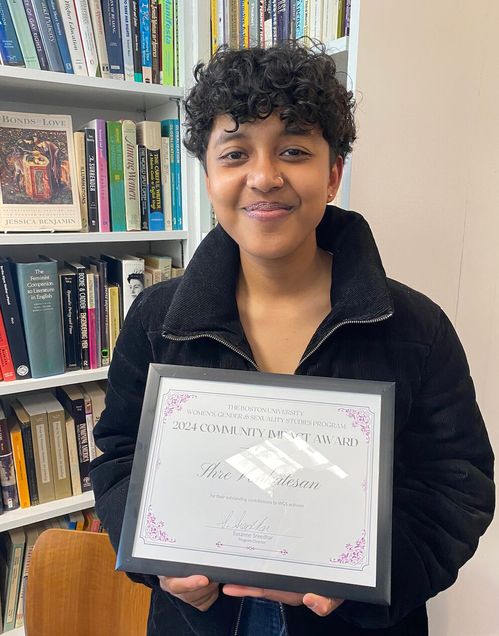By Rayea Jain (COM’26)
The Women’s, Gender, and Sexuality Studies Program (WGS) has created a new Community Impact Award to honor students serving marginalized communities through their advocacy and research.
“This award celebrates individuals who exemplify the values of social justice, inclusivity, and dedication to the well-being and advancement of marginalized communities,” said Sarah Miller, senior lecturer in sociology and director of undergraduate studies in the Women’s, Gender and Sexuality Studies Program. It is funded by external donors, as well as proceeds from the program’s annual Book Fair.
The inaugural awardees of the Women’s, Gender, and Sexuality (WGS) Community Impact Award are Bahar Aldanmaz, a doctoral candidate in sociology who researches and advocates for menstrual justice and global health and co-founder of an organization dedicated to ending “period poverty” in Turkey, and Shre Venkatesan (CAS’25), an economics and sociology major whose research focuses on estranged students’ access to healthcare, specifically in marginalized communities.
Arts × Sciences spoke with both awardees about their research and the passions that drive them.
Bahar Aldanmaz

“If you don’t have access to a pad or a tampon, then you are experiencing period poverty,” said Bahar Aldanmaz, a doctoral candidate in sociology who researches and advocates for menstrual justice and global health.
Growing up in Adana, Turkey, Aldanmaz was familiar with the lack of exposure to menstrual education. But she didn’t realize the full extent of the problem until college.
That’s when Aldanmaz approached İlayda Eskitaşçıoğlu, a Turkish human rights attorney who had posted the idea of creating a non-governmental organization on her Facebook. Eskitaşçıoğlu was assembling care packages for families affected by an earthquake in 2011 and noticed the lack of menstrual products during a natural disaster. Aldanmaz had a background in sociology and psychology was interested in helping.
Together they founded the Konuşmamız Gerek Association (“We Need to Talk” Association), dedicated to helping Turkish women access sanitary restrooms, clean water, reliable menstrual health information, and/or a safe space to talk about menstruation.
The organization started as a “slow-paced social initiative with a couple of volunteers,” Aldanmaz said. The team lived in Aldanmaz’s house in southern Turkey and worked with local farmers, organizing focus groups of men, women, and children to better understand menstrual health and accessibility.
In 2016, Aldanmaz moved to the United States to attend The Master of Arts in Social Sciences, with a graduate certificate in Gender, Women, and Sexuality Studies. to study sociology at Boston University, hoping to find a solution to the lack of menstrual health in her home country.
Aldanmaz’s fieldwork took off after a 7.8-magnitude earthquake hit southeast Turkey in February 2023. Konuşmamız Gerek was the only organization prepared to provide menstrual care to those affected by the natural disaster and the group expanded as a result. Volunteers spent five months working with female support groups in Turkey and educating people on making communities period-friendly during a crisis.

On May 28, 2024, Konuşmamız Gerek launched a menstrual justice ambassadors program. The 21 ambassadors, chosen from more than 500 applications, will spend the next year serving in a youth council and working on personal projects within menstrual health. Konuşmamız Gerek is also organizing workshops to expand their team of menstrual health educators in Turkey.
“We wanted to create opportunities for young Turkish people who want to make change,” Aldanmaz said.
At the same time, Aldanmaz has become an advocate in the United States. She is networking with American organizations to fund the growth of her program in Turkey and writing academic articles and op-eds about menstrual health.
She is grateful to have received recognition for her work but said the most rewarding part of her research and advocacy remains her time in the field in Turkey. “When I’m in the field, I’m never tired,” she said.
Shre Venkatesan (CAS’25)

For some families, not all conversations are easy. And when it comes to healthcare, not all students are in a position to access the same medical resources.
“It’s really underrated as to how much healthcare depends on how close you are with your biological family,” said Shre Venkatesan (CAS’25), when asked about their interest in researching the intersection of estranged students and accessible healthcare.
Through their research, Shre discovered that there are four stages of estrangement, ranging from being emotionally distant from your parents to having completely no contact with them. Regardless of the degree, any disconnect between students and their families can be an added obstacle when it comes to healthcare. And in LGBTQ+ communities, complex family dynamics can make conversations about gender-affirming procedures difficult, if not impossible.
Moving from Trichy, India when they were 18, Shre began their freshman year at Boston University as an economics major. After taking a few introductory sociology classes, they started recognizing the underlying sociological aspects of economic issues, and became especially interested in how economic policies affect social groups and how societal changes impact markets.
“While Economics provided me with analytical tools to understand market behaviors and policy impacts, Sociology offered insights into the societal and cultural contexts that shape economic systems,” Shre said.
Shre’s interest in the intersection of economics and sociology directed them to public health, where they became interested in researching “the profound impact of social determinants on health outcomes.”
During their junior year, Shre began volunteering as a research assistant at the BU School of Public Health. They primarily researched the impact of COVID-19 on tuberculosis (TB) rates among incarcerated individuals. “Working on this project not only deepened my understanding of public health challenges but also reinforced my commitment to contributing to solutions that address health inequities,” Shre said.
Working with Sociology professor Joseph Harris, Shre started their research by gathering resources and reading materials to gain background knowledge on the healthcare landscape. Sociology professor Heather Schoenfeld also guided their research by offering her insight into public policy.
Shre spent most of the Spring 2024 semester gathering data on what they considered a group that is “underrepresented and difficult to reach,” which has been one of has been one of the challenges of their research.
“This scarcity of prior studies meant that I had to rely heavily on primary data collection and build my research framework from the ground up,” Shre said. However, while there was limited research on healthcare issues among estranged students, this also motivated Shre to amplify the experiences of an underrepresented community.
To comprehend the complexity of this field, Shre has been conducting interviews with estranged students in the Greater Boston area. According to Shre, “establishing trust and ensuring anonymity” was essential to helping participants feel comfortable sharing their struggle navigating healthcare without familial support.
As Shre continues conducting interviews, they have been able to foster more than just professional connections. Working closely with the community of estranged students in Boston, Shre described the experience of connecting with students who share their experience as “enlightening and empowering.”
“Many of these students often feel overlooked and marginalized, and being able to bring their challenges to light has been a profound and meaningful aspect of my work,” Shre said. “It’s incredibly meaningful to be recognized for work that not only aligns with my academic pursuits but also resonates with my passion for advocacy and social justice.”